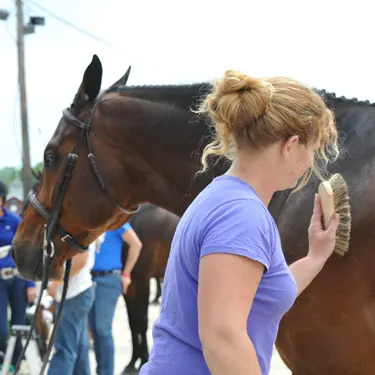So you think you want to be a professional groom? Liv Gude of Professional Equine Grooms has some words of wisdom…
You should DO IT. I say that because I was a professional groom for years, and looking back, it was the best way to further my education as a horseman.
Grooms are the only people in the horse world that get to specialize in everything! We know boatloads about veterinary care, farrier work, tack repair, riding, horse handling, rig driving, arena maintenance, fence repair, hay and grain quality, and even grooming! Other jobs within the horse industry are very specialized, and often accompanied by paperwork (ugh).
Being a pro groom allows you to learn all that you want from those specialties, as you are interacting with them all day long.
Grooming is ridiculously hard work. A typical day for me as a pro groom was easily 11 to 12 hours, six days a week. It was sometimes more, depending on the competition schedule, thrown shoes, colics, early morning or late night transport.
We started at 6 a.m. sharp with feeding hay and grain, mucking, and getting the arena ready. As we were doing this, we were unwrapping bandages, taking temperatures, and un-blanketing. Depending on the time of the first ride, we might be able to turn out some of the retired horses or put some horses on the hot walker.
ADVERTISEMENT
Then comes grooming and tacking up, untacking, cooling out, hot walking, icing legs, scooping the poop from the arena, changing turn-outs, bathing, cleaning tack, you get the picture. A typical day had all the horses coming out of their stalls two or three times for some sort of activity, be it a hand-walk, turn-out, a ride, a lunge, or the hot walker. By lunch all of the horses had been out at least once, some twice already.
Then you lather, rinse, repeat for the afternoon. Sprinkle in the appointments for the day such as the saddle fitter, veterinarian, farrier, massage therapist, and all of the owners and clients, and you are one busy pro groom. You need to be able to plan ahead, learn the fine art of never walking anywhere empty handed, and you must deal with sweating and freezing.
You will never smell good, you will never be clean, and you will sometimes wake up unable to move because you stacked a semi-truck’s worth of hay the day before. Clean fingernails will make you feel like you have been at the salon for a manicure, when in reality you used the brush end of a hoof pick and a garden hose to wash your hands. You will no longer care about good and bad hair days, they are ALL bad hair days, so a hat is your new BFF.
You are thrilled to go on the road to shows, but after working 17 hours on the first day you likely want to cry. It’s not just a physically demanding job, it can be emotionally demanding as well. You will become involved and attached to clients and horses and other grooms. It’s a tiny, tiny horse family.
But things happen—clients change barns, horses get hurt, your fellow grooms move on. Horses are born, horses are bought and sold, horses pass on. Your heart will be moved by all of this, no matter how stoic you are. This is the hardest job in the horse industry.
Of course there can be perks and bonuses and awesomeness all around. The best riders in the world can take you globe-trotting to major horse competitions. Olympics, anyone?
ADVERTISEMENT
Even the smallest of perks, like hats or shirts from your rider’s sponsors, are awesome. (Like you have time to shop anyway!!) Perhaps the biggest perk is the one you create yourself—the education.
Spend your days watching and asking questions. Know the farrier, veterinarian, and every other person on the team and ask questions. Learn. Be a sponge. Take your time as a groom and make yourself a better horseperson. Ask the seemingly stupid questions—in the worst case scenario you look silly, but in the best case scenario you stumble onto something that could save a horse’s life.
The less-than-savory stuff that is often swept under the rug in the horse industry is where the job can really break you, but it takes some knowledge and guts to find the right situation as a groom. Work for people you respect and want to learn from.
Spend some time getting to know your state’s employment laws when it comes to working as a groom. Learn the difference between being an independent contractor and an employee and do your research if you are presented with an apprenticeship, internship, or working student position. Often these are fancy names for “employee” in an effort to skirt around some employment laws, but they are also often legitimate opportunities of a lifetime.
Be clear about expectations of wages and possible overtime. Make sure that your employer has worker’s compensation insurance for you—most states are crystal clear on the requirements. This protects you if you are injured on the job, and can even pay your lost wages. It also protects your employer. Without these safeguards, your hard work can get flushed down the drain with one accident. Knowing the employment laws will save your hide.
Being a pro groom can take you from your backyard to an international arena, but it won’t happen without a whopping dose of hard work and some major dedication. At the end of the day, though, it’s all worth it. Remember, what you get out of it is what you put into it!














